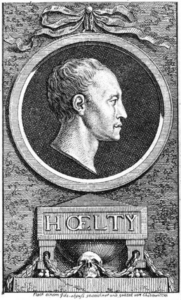Love song
(Poet's title: Minnelied)
Set by Schubert:
D 429
[May 1816]
Holder klingt der Vogelsang,
Wann die Engelreine,
Die mein Jünglingsherz bezwang,
Wandelt durch die Haine.
Röter blühet Tal und Au,
Grüner wird der Wasen,
Wo mir Blumen, rot und blau,
Ihre Hände lasen.
Ohne sie ist alles tot,
Welk sind Blüt’ und Kräuter;
Und kein Frühlingsabendrot
Dünkt mir schön und heiter.
Traute, minnigliche Frau,
Wollest nimmer fliehen;
Dass mein Herz, gleich dieser Au,
Mög in Wonne blühen!
The birdsong sounds more beautiful
When she who is as pure as an angel,
Who captured my youthful heart,
Wanders through the woods.
The valley and the meadow bloom with more red,
The grass becomes greener,
Where she chose red and blue flowers for me
She picked them with her own hands.
Without her everything is dead,
Blossoms and herbs have wilted;
And no spring sunset
Appears beautiful or pleasant to me.
Devoted, loving woman,
May you never depart;
So that my heart, just like this meadow,
Might blossom in bliss!
All translations into English that appear on this website, unless otherwise stated, are by Malcolm Wren. You are free to use them on condition that you acknowledge Malcolm Wren as the translator and schubertsong.uk as the source. Unless otherwise stated, the comments and essays that appear after the texts and translations are by Malcolm Wren and are © Copyright.
☙
Themes and images in this text:
Angels Birds Blue Evening and the setting sun Fading and losing colour Fields and meadows Flowers Grass Green Hands Hearts Red and purple Spring (season) Valleys
The first two stanzas are based on comparative structures. Her presence makes the poet’s experience of the world more intense: birdsong is more beautiful, grass is greener, flowers are redder (this sounds odder in English than in German, probably). The second two stanzas attempt a different type of comparison. What would the world be like if she were not in it, or rather, what will the world be like when she is not in it? The poet is contemplating the possibility of the beloved’s death.
There will still be flowers and sunset but they will not have the same intensity or emotional effect. The thought of these herbs and flowers wilting and fading shocks the writer into the realisation that the blossoming has been within his own heart and that it could all too soon come to an end.
☙
Original Spelling Minnelied Holder klingt der Vogelsang, Wann die Engelreine, Die mein Jünglingsherz bezwang, Wandelt durch die Haine. Röther blühet Thal und Au, Grüner wird der Wasen, Wo mir Blumen, rot und blau, Ihre Hände lasen. Ohne sie ist alles todt, Welk sind Blüt' und Kräuter; Und kein Frühlingsabendroth Dünkt mir schön und heiter. Traute, minnigliche Frau, Wollest nimmer fliehen; Daß mein Herz, gleich dieser Au, Mög' in Wonne blühen!
Note on the text
Schubert changed stanza 2 in the course of composition from Hölty´s original. Most commentators assume this is because the reference to ‘meiner Frau’ (my wife) was inappropriate for the unmarried Schubert or too sensitive (too ‘forward’) if the song was intended for Theresa Grob.
Röther blühen Thal und Au, Grüner wird der Wasen, Wo die Finger meiner Frau Maienblumen lasen. The valley and the meadow bloom with more red, The grass becomes greener, Where my wife's fingers Have picked May-flowers.
Confirmed by Peter Rastl with Schubert’s source, Gedichte von L. H. Ch. Hölty. Neu besorgt und vermehrt von Johann Heinrich Voß. Wien, 1815. Bey Chr. Kaulfuß und C. Armbruster. Gedruckt bey Anton Strauß. Meisterwerke deutscher Dichter und Prosaisten. Drittes Bändchen. page 144; and with Gedichte von Ludewig Heinrich Christoph Hölty. Neu besorgt und vermehrt von Johann Heinrich Voss. Hamburg, bei Carl Ernst Bohn. 1804, pages 175-176.
Note: This is the version as published by Voß. The initial version of this poem, according to Hölty’s manuscript, has one more stanza and is quite different.
Note: According to Neue Gesamtausgabe Schubert set only stanzas 1 and 2. In his autograph he crossed out the repeat mark at the end.
To see an early edition of the text, go to page 144 [222 von 300] here: http://digital.onb.ac.at/OnbViewer/viewer.faces?doc=ABO_%2BZ15769170X


